Transforming Medical Affairs in Pharma with Gen AI Insights
As pharmaceutical companies navigate the complexities of modern healthcare, the integration of emerging technologies—particularly generative AI (Gen AI)—is becoming crucial for optimizing medical affairs. Medical affairs teams play a pivotal role in managing the interaction between the pharmaceutical company and healthcare professionals, ensuring that scientific information is accurately communicated while addressing the needs of patients. This article will explore the profound impact Gen AI in life sciences can have on medical affairs, enhancing decision-making processes, streamlining operations, and ultimately driving better healthcare outcomes.
The Role of Medical Affairs in Pharma
Medical
affairs pharma are integral to pharmaceutical companies, encompassing
responsibilities that include clinical research, medical education, and ethical
compliance. These professionals foster relationships with healthcare providers
(HCPs), translating complex clinical data into actionable insights. By focusing
on pre-launch and post-launch activities, they support product development and
effectively communicate drug benefits, risks, and real-world applications to
various stakeholders.
The evolving healthcare landscape demands that medical
affairs teams keep pace with rapid advancements in science and technology—from
personalized medicine to digital health innovations. As such, understanding
these evolving needs is essential.
How Gen AI Enhances Medical Affairs
Generative AI excels at analyzing and synthesizing vast datasets, providing
insights into emerging healthcare trends and clinical data. By leveraging
machine learning algorithms, pharmaceutical companies can optimize their
medical strategies in several ways:
1. Data Analysis and Insight Generation: Gen AI can process and analyze patient data, clinical
trials, and real-world evidence much faster than traditional methods. This
allows for swift identification of therapeutic areas with unmet needs, aiding
medical affairs teams in prioritizing resources effectively.
2. Predictive Modeling:
Predictive analytics powered by Gen AI can forecast market trends, patient
behavior, and potential outcomes. Medical affairs teams can use these insights
to prepare impactful educational programs and advocacy efforts.
3. Enhanced Communication Tools: AI-driven tools can facilitate streamlined
communication between medical affairs teams and healthcare stakeholders. For
instance, AI chatbots can provide real-time responses to HCP inquiries, while
AI-generated reports and summaries can keep teams informed about recent studies
and advancements in their therapeutic areas.
Improving Communication and Collaboration
The integration of Gen AI enhances collaborative efforts among medical affairs
teams and healthcare stakeholders. Through AI-enabled platforms, stakeholders
can share and access vital information seamlessly, fostering a more cohesive
approach to patient care.
·
Feedback
Loop: Gen AI can facilitate a feedback loop where
healthcare professionals share insights from clinical practice, which can be
analyzed by medical affairs for further understanding and refinement of medical
communication strategies.
·
Training
and Education: Advanced training modules that utilize Gen
AI can help educate both medical affairs teams and HCPs about new treatment options.
Simulations can prepare medical professionals to discuss complex data with
confidence.
Challenges and Opportunities
Despite the clear benefits, incorporating Gen AI into medical affairs is not
without challenges. Data privacy and compliance with healthcare regulations
remain paramount. Handling sensitive patient information necessitates robust
security measures and adherence to regulations such as HIPAA in the United
States.
Moreover, there is a need for medical affairs
professionals to become familiar with AI technologies. Ongoing training and
development will be necessary to ensure that teams can effectively leverage Gen
AI tools to their fullest potential.
However, the opportunities lie in the ability to deliver
tailored, data-driven solutions that not only enhance business operations but
also ultimately benefit patient care. The synergy of data science and medicine
holds the promise of personalized strategies that improve treatment delivery
and outcomes.
Conclusion
By embracing generative AI in medical affairs, pharmaceutical companies can
unlock unprecedented levels of efficiency, effectiveness, and innovation. As
the healthcare landscape continues to evolve, those who adapt by leveraging
advanced technologies will lead the way in delivering value to patients and
healthcare providers alike.



Comments
Post a Comment